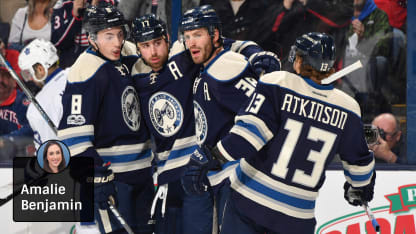That was where they started Saturday in the overarching panel called "The Long Thaw: Hockey's Embrace of Analytics," held at the MIT Sloan Sports Analytics Conference in Boston, and comprised of former NHL consultant Tyler Dellow, Columbus Blue Jackets director of hockey administration Josh Flynn, Puckalytics owner and operator David Johnson, and National Women's Hockey League player Hilary Knight.
"I think that a big thing is getting the NHL, both the NHL and the media, to incorporate data in their broadcasts and tell stories using data, as opposed to using the coach's opinion or the analyst's opinion," Johnson said. "Find a way to back up those storylines with actual data."
The group addressed other topics, from how to improve evaluations of defensemen to the importance of extracting special teams data vs. 5-on-5 data to the quantification of chemistry among teammates.
But the accessibility of information and the ways to get it to the public was a crucial one.
An oft-cited example was that of the Blue Jackets power play, something that helped push Columbus to a 16-game winning streak earlier in the season.
"What I found fascinating was the story was, 'Oh, Columbus is winning, Columbus is winning,' and one of the big things to me was Columbus had this first-unit power play, and it had Sam Gagner, Zach Werenski, [Alexander] Wennberg, Nick Foligno, Cam Atkinson," Dellow said. "It was unbelievable. They were scoring like the best power-play unit of the last decade. But because the League doesn't gather and promote on a per-unit basis how power-play units are doing, that story wasn't really out there."


















